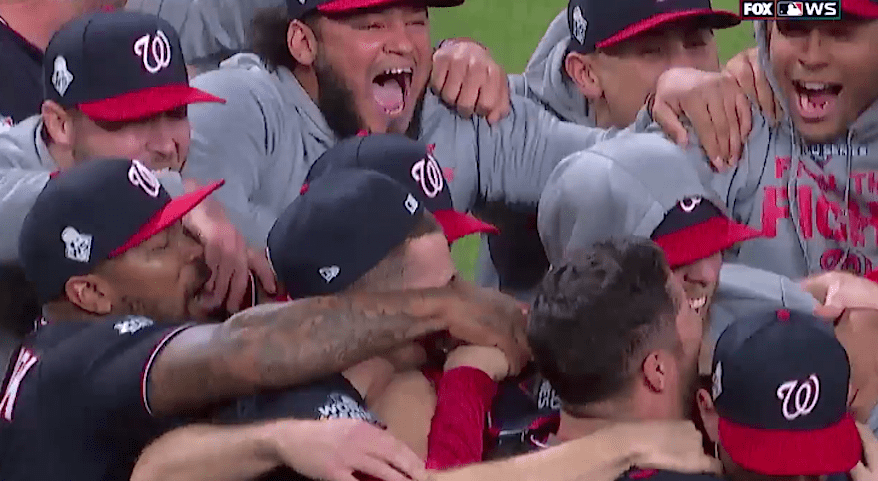Our Nationals, Now and Forever
By • October 31, 2019 0 806

Washington went crazy Wednesday night.
It had nothing to do with impeachment hearings, witness testimonies, Donald Trump, the royals, forest fires far away, vaping or anything else that normally consumed our troubled sleep.
Washington at last and finally went totally crazy on Wednesday, Oct. 30, 2019, for the Washington Nationals (not to be confused with any sort of nationalists).
Washington went crazy for the Nationals. And they weren’t even here.
The Nationals, at long last, in typical, heroic, come-from-behind fashion, had won the franchise’s first World Series championship, somewhere close to within the time that the clock struck midnight in Washington, D.C., around 11 p.m. in Houston.
That’s when the last out was recorded in the Nats’ convincing and final 6-2 victory over the heavily favored and now deeply disappointed Houston Astros, the American League champions, considered to be perhaps baseball’s best team by all the analytics and a 107-win season record.
In this World Series, there was, astonishingly, the fact that for the first time, the home team never won (or always lost) and the visiting team always won (or never lost).
If you start thinking about this, you have to consider that the idea of momentum is either overrated or upside-down. The Nats beat the Astros twice in Houston, 5-4 and 12-3, which gave the team and its fans not merely hope that they would and could win the World Series, but that winning it was practically a sure, 99.5-percent thing.
All over the District, in newspapers and on sports shows and local news and street corners and buses, there was talk of: (a) a 4-0 sweep, just like the Nats had done to the St. Louis Cardinals to gain entry to the World Series, or (b) as time passed, a close-out later on.
None of that happened. The Nationals went into a disheartening, dispiriting, hugely disappointing downward spiral that got progressively and mysteriously worse, a kind of trance of losing, a trail of three straight losses — 4-1, 8-1 and 7-1 — that now made the prospect of a championship seem hopeless.
Which is, of course, the time you should have bet your last bona fide dollar if you could have, because that’s when the Nats stars come out to play at their best.
All season, beginning with a near-midterm 19-31 record of frustration and failure which made manager Dave Martinez’s job look to be in jeopardy, the Nats came back, punching, pulling and jerking and at times ripping off runs by the bundle, going on clutch winning streaks. They just barely made the playoffs to win a loser-go-home, come-from-behind 4-3 wild-card game over Milwaukee, then won two elimination games over the Los Angeles Dodgers and swept the Cardinals.
All of this was achieved with clutch hitting and guts and with overpowering pitching when needed — by the stoic, heroic Zimmerman to start with, the ebullient, sassy Soto with homers, Mr. Clutch Rendon, the bullheaded Mad Max Scherzer and the unruffleable, maybe unknowable, Strasburg on the mound, Doolittle in relief, looking like a guy studying for his master’s final, and the elder elder statesman McKendrick delivering home runs in his prime prime. Usually, it began around the sixth and seventh innings, as it did Wednesday, the Nats behind or clinging to a precarious lead, and then the big bats booming.
Even though Rendon, who may yet be the National League MVP and who remains unsigned, delivered like a postman in a snowstorm, it was Strasburg who got the series’ Most Valuable Player award, standing next to the series trophy — a cross between a candelabra and an upside-down chandelier — accompanied by his wife and two daughters. He was, even in the moment of all your dreams achieved, solid as Gary Cooper, his cap as ever concealing his eyebrows (so that we are not sure if he has eyebrows).
That 6-2 score was not easily achieved. It took excruciating time, timely hitting, bone-gnawing tension and all the sudden drama that baseball can provide. When that last out finally came about, it was an exhalation as much as a jump-up-and-down moment.
It’s what baseball in modern times of the 21st century is all about, and always has been all about.
Here in Washington, that last game, we’re pretty sure, enveloped and drowned out the outside world, healed wounds and clamped down on the reality of political distraction and angry voices. It absorbed us with our attention and made us feel focused on the moment.
We happened to be at a Washington National Opera performance of Verdi’s take on Shakespeare in a production of “Otello” (not “Othello”). Even here, the Nats were only a heartbeat away, as when WNO General Director Timothy O’Leary came out wearing a Nats cap, and cautioned the audience to, per modern custom, “turn off your devices, and please, please, don’t turn them on to check the score.” This was later undermined by a gentleman who flipped on his phone later on to show me the score: 1-0 in the fourth, Houston, a disquieting but not hopeless fact.
We came to near tears as soprano Leah Crocetto’s Desdemona gave herself over to “Hail Mary” and tenor Russell Thomas as Otello angrily challenged: “Has heaven no more thunderbolts?” We left the Opera House shaken, but also, with anticipation, recognizing that baseball is part of our life lived simultaneously.
We got home just in time for the last three innings of the last game of the season. Heaven, it turns out, still had some thunderbolts.
We won.
Washington, with the Redskins in death-like repose, remains a sports town after all. The Caps, two years ago. The Mystics, just a little time ago.
And now and forever. The Nationals. World Series champs. Now and forever.
The town, this town, went nuts.

